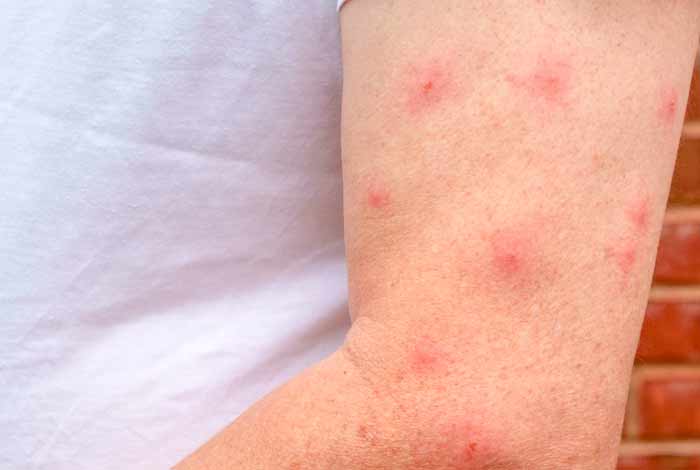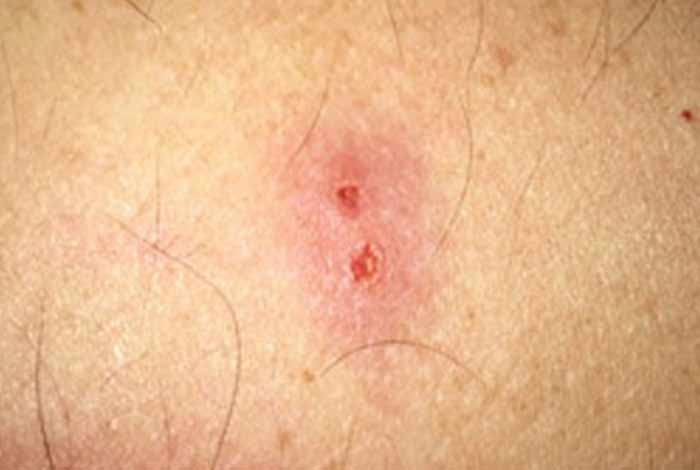Both spiders and mosquitos bite but you might be asking yourself whether the bites look similar or whether there is a difference. The two bites can easily be distinguished since there exists a huge contrast between the two insects, specifically in the way they bite. Spiders have a tendency of leaving lasting effects on the skin after their bite while the mosquitos will leave you having an itchy feeling and thereafter the itchy feeling subsides. Following are details
Table of Contents
Mosquito Bites vs Spider Bites
Mosquito Bites-Appearance with Pictures
A mosquito bite appears as a tiny white puffed up bump on the skin. The center of the bump is tiny and glows red. This is usually the part that itches. The appearance, however, differs for different people.
The bites’ appearance varies based on a number of factors. The skin sensitivity and the species of the mosquito are a few factors that influence the appearance of the mosquito bite.
Mosquito saliva has a chemical component that contains proteins. This protein can trigger someone’s immune system. For a mosquito to bite, it inhibits blood clots when penetrating the skin. When biting, it injects saliva in which the immune system treats as a foreign substance, thus triggering an immune response.

If you happen to be prone to allergic reactions, then larger and more irritating swellings can form on the bitten region. The swelling might be extremely large or very tiny depending on your skin sensitivity and the type of mosquito that bit you.
Mosquito bites often cause a mild reaction that mainly happens to people with weaker immune systems. The bite ends up causing hives and massive swellings. Such reactions require immediate medical attention.
Spider Bites-Appearance with Pictures
The spider bite will not offer any symptoms or evidence not until a few hours have elapsed. The appearance and symptoms vary depending on the spider species that bit you. Common symptoms include;
- Red skin on the bitten area
- Pain or soreness at the bitten site
- Swelling
- Two puncture marks on the skin
- Severe allergic reactions
The spider bite is usually a single or twin puncture wound at the center. You may experience an extended lesion that looks similar to a large bruise. The lesion is most often swollen and painful. You might also develop an open sore that takes time for the skin to heal. In other cases, the bite goes unnoticed.

The black widow spider causes symptoms such as sweating, headaches, chills, and dizziness. The effect of the spiders’ venom includes muscle cramps in the stomach and on the legs. The venom also causes an increased heart rate and you might feel exhausted. This spider often leaves two marks on the skin, since it has two fangs that it uses to inject poison into the skin.
The brown recluse spider will only leave you with a tiny irritating spot on the skin. The brown recluse spider causes less damage as compared to the black widow.
Differences Between Mosquito Bites and Spider Bites
Mosquitos select their prey using a body odor oriented mechanism since they have odor receptors at the antenna. This mechanism distinguishes perspiration levels for different people. On the other hand, spiders only attack human beings when they feel their space has been intruded or as a defense mechanism.
Mosquito bites cause the human immune system to react by producing antibodies to counter the antigens released by the mosquito saliva. The bitten site is usually itchy for an hour or more. Spiders on the other hand release venom that causes nerve damage to their prey.
To prevent mosquito bites, there are numerous gel products and spray solutions that you can use to repel the mosquitos. The products usually affect the mosquito’s sense of smell and thus drives them away. Spider bites are avoided by consulting exterminators who get rid of them.
Mosquitos use their smell mechanism while spiders’ reactions are a result of a defensive mechanism to scare away predators.
Spider bites can affect a person’s nervous system while mosquito bites cannot.
When mosquitoes bite, they puncture one hole and inject saliva into the bloodstream. This causes swelling and itching but in some cases go unnoticed. Spiders, on the other hand, create either one or two puncture wounds on the skin. Spiders have fangs or chelicerae that they use to inject venom into a person’s body.
The spider bite hurts more and creates a greater itchy feeling as opposed to the mosquito bite.
The saliva injected by the mosquito sometimes carries dangerous diseases like malaria and dengue fever. The spider venom does not contain any diseases.
Similarities Between Mosquito Bites and Spider Bites
Both swellings cause itchiness, red discolorations, and swellings on the skin.
Bites from both the mosquito and the spider can cause allergic reactions. Both insects release toxins into the body and the human immune system reacts.
Both bites may appear similar at times considering that they may both leave one bite mark. In some cases, the spider leaves two marks.
Frequently Asked Questions
Can mosquito and spider bites transmit AIDS or hepatitis?
No, numerous tests have been conducted to verify this statement yet no evidence has been uncovered to suggest that the saliva secreted by the mosquito or the venom by the spider, transmits any of those diseases. The virus causing AIDS never survives in either a mosquito or a spider. The insects’ proboscis has separate channels to drive blood and saliva or venom. This way, both hepatitis, and AIDS can never be transmitted via these insects.
How can I treat the bites to stop the itching?
Both cold water and ice are effective remedies for reducing itchiness. There are also a variety of over the counter medications that can either be applied or taken to soothe the skin. Drugs such as Eurax and Stingose can be obtained from the local pharmacy. You can also use antihistamines and in severe cases, it is advisable that you seek medical attention.
Further Reading
- Bed Bug life cycle-Eggs, Baby(Nymph) to Adult Stages & Pictures
- How to Detect Bed Bugs-Detectors, Light & Verifi Reviews
- How to know if Bed Bugs are gone after Treatment & what to do
- Will Bleach Kill Bed Bugs-How does it work?
- Best Bed Bugs Traps- DIY Homemade, Co2, Yeast + Reviews
- How to Deal with Bed Bugs in your Car
- Bed Bugs in Couch-Covers, Signs & How to Get rid
- How to Kill Bed Bugs with Steam: Best Steamers & Guide + Tips
- Does Alcohol Kill Bed Bugs? Rubbing, Isopropyl & Percentage
- How Long do Bed Bug Bites Last, Take to Appear, Go Away & Heal
- Natural Predator of Bed Bugs-What Insects/Bugs eat Bed Bugs?
- Can Bed Bugs Live in TVs & Other Electronics? How to get them out
- Do Bed Bug Bites Itch or Hurt?
- Bed Bug Interceptor-How it works, DIY & Reviews
- What do Bed Bug Bites look like? Pictures & Identification Steps
- What Attracts Bed Bugs & things they Hate /Dislike Most
- Can Bed Bugs make you Sick? How are they Dangerous?
- Can Bed Bugs Fly-Do they have Wings-How Far can they Travel
- Diatomaceous Earth for Bed Bugs-How to Use & Best Reviews
- DIY Bed Bug Heat Treatment: Success Rate,Temperature Chart, Preparation & Reviews
- Does Vinegar Kill Bed Bugs? Can it be Used for Bites?
- How to Get Rid of Bed Bugs on Mattress- Best Covers, Protectors & Encasement Reviews
- Can Bed Bugs live on or Bite Dogs & Cats (Pets)?
- Bugs that look like Bed Bugs-Beetles & Others that Resemble or Mistaken
- Bed Bug Bombs-Do Foggers work? Effectiveness & Reviews
- Bed Bug Repellents -Natural Homemade, Creams, Electronic & Reviews
- How do Bed Bugs Spread? Are they Contagious? How Fast/Easily from Person, Room or House?
- Best Bed Bug Sprays-DIY Homemade, Natural, Brand Reviews
- Flea Bites vs Bed Bug Bites + Differences & Pictures
- How to Prevent Bed Bugs-Bites while Sleeping at Home, School, Hotel & Travelling
- How to get rid of Bed Bugs on Clothes-Can they Live, Bite through or Travel on Laundry
- Fumigation for Bed Bugs-Cost & Preparation
- How to get Bed Bugs out of Carpet with Cleaner & Powder
- How Long do Bed Bugs Live Without Food, Host, Air, in Cold & After Spraying
- Bed Bug Rash on Skin, Pictures, Treatment, Allergy & Symptoms
- Where do Bed Bugs Hide and how to Find them
- Mosquito Bites vs Bed Bug Bites-What’ are the differences
- Identifying Bed Bug Eggs- How they look like, Images & destruction
- How do you know if you have Bed Bugs-Symptoms & Signs
- Bed Bug vs Spider Bites- Differences with Pictures
- Bed Bug Sniffing Dogs-How they smell, Sense, Roscoe, Breeds & Cost
- What are Bed Bugs? Names in other Languages
- Where do Bed Bugs come from? Causes, how you get them & Start
- How to Kill/Get Rid of Bed Bugs Fast Yourself Naturally for Good
- Bed Bugs in Hair Symptoms, Pictures & Get rid
- Types of Bed Bugs
- Bed Bug Poop/Droppings-How it looks like, Pictures +Identification
- Bed Bug Shells, Cast Skin & Exoskeleton
- Can you See Bed Bugs with the Naked eye? Pictures, Size, Color & Anatomy
- Dust Mite vs Bed Bug Bites